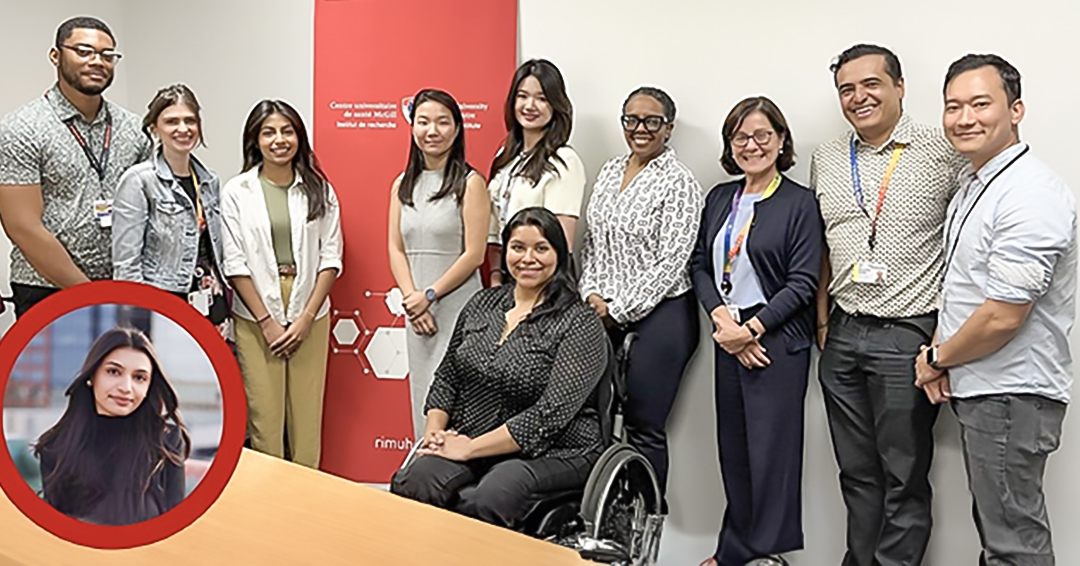
The awards for Equity, Diversity and Inclusion in health care research recognize the academic excellence of medical and health science students from racialized groups
The allocation of scientific funding has not always been equitable. Historically, some groups have been underfunded or marginalized, including researchers from Black, Indigenous and other racialized communities. To address this critical funding gap, the eight awards for equity, diversity and inclusion (EDI) in healthcare research were launched at the RI-MUHC.
These EDI funding awards are available to Masters and PhD students who have the potential to advance medical research based on the excellence of their academic record, and who belong to a racialized group. This competitive submission process is coordinated by the RI‑MUHC. Working with the MUHC Foundation, Fiera Capital Corporation has committed $120,000 over three years to fund these important awards for talented young researchers. The Montreal Children’s Hospital Foundation is also an important financial supporter of this program.
Early-career funding is essential to a researcher’s future success. If scientists from Black, Indigenous and other racialized communities do not receive financial support early on, it can affect the trajectories of their entire careers. The EDI awards in health care research aim to help address this shortfall. All eight recipients of these EDI awards conduct research at the RI‑MUHC and benefit from the supervision and mentorship of experts in health research.
“The Research Institute of the McGill University Health Centre is committed to inclusivity and empowering diverse voices in medical research. We are an internationally recognized research powerhouse, drawing exceptional scientists and trainees from across the globe. We recognize the invaluable contribution of diverse perspectives in fueling innovation in health care research. These awards are an important step towards equitable scientific funding and ensuring that talented researchers from underrepresented communities receive the support they deserve.” —Rhian Touyz, MD, Executive Director and Chief Scientific Officer, RI-MUHC
The eight recipients of the 2024 EDI awards for academic excellence in healthcare research are:
Zafina Budhwani, a Master’s student specializing in human genetics, is studying the role of a specific protein, called Claudin-3, in a process referred to as neural tube closure. Research shows that improper neural tube closure can lead to birth defects.
Jéssica Ding, a nurse clinician and Master’s student in Advanced Nursing at McGill. She is currently exploring the use of virtual reality as a method of pain and anxiety control.
Nicholas Hickens, a trainee in the Department of Family Medicine at McGill University whose research interests include chronic diseases, public health ethics, and empowering the well-being of marginalized populations.
Suleima Jacob-Tomas, a PhD student in the Integrated Program in Neuroscience at McGill University. She has always been passionate about understanding how complex neural interactions influence an organism’s behavior, with the hope of one day contributing to interventions and healing.
Hani Rukh-E-Qamar, a Master’s student in McGill’s Department of Epidemiology, Biostatistics and Occupational Health who is passionate about translational research across digital health, health care accessibility, and sexual and reproductive health.
Yichun Sun, a PhD student in McGill’s Division of Experimental Medicine, is looking to improve treatments and outcomes for patients suffering from rare immunodeficiencies.
Thupten Tsering, a PhD student in McGill’s Department of Pathology, is studying how cancer cells release tiny packages called extracellular vesicles. These vesicles carry DNA and proteins from cancer cells to other cells in the body and can help us better understand how cancer spreads.
Sacha Williams, a Jean-Martin Laberge Global Pediatric Surgery Fellow and PhD student in the Surgical and Interventional Sciences division of McGill’s Department of Surgery. She is researching the impact of gender on surgical care in Africa.
“I am honoured to be a recipient of an award this year. These awards are exceptionally meaningful in the way they combine academic excellence with a greater recognition of inclusiveness and equity for underrepresented groups in health research. I’m looking forward to pursuing my work in the evaluation of a self-testing digital strategy for predicting negative and positive cases of COVID-19 infections, and grateful for the additional financial support this award will provide.” — Hani Rukh-E-Qamar, Master’s student and 2024 EDI Award recipient
The awardees were chosen by an interdisciplinary evaluation committee that focused on the candidates’ academic quality, on their self-reflexivity on the systemic barriers they have faced to do research, and on their potential to impact other members of racialized groups.
